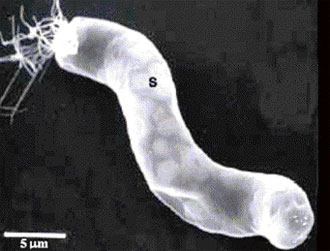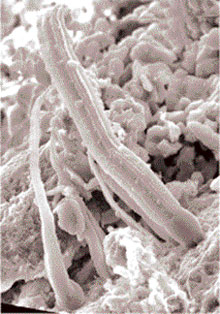|

Has NASA scientist found
evidence of alien life?
Aliens exist, and we have proof.That astonishingly awesome claim
comes from Dr. Richard B. Hoover, an astrobiologist at NASA's Marshall
Space Flight Center, who says he has found conclusive evidence of alien
life," fossils of bacteria found in an extremely rare class of meteorite
called CI1 carbonaceous chondrites. (There are only nine such meteorites
on planet Earth.)
Hoover's findings published late Friday night ( March 4) in the
Journal of Cosmology, a peer-reviewed scientific journal, interpret it
as indicating that life is more broadly distributed than restricted
strictly to the planet Earth. Hoover, who has spent more than 10 years
studying meteorites around the world, told FoxNews.com in an interview.
"This field of study has just barely been touched, because quite
frankly, a great many scientist would say that this is impossible."
|

Micro-organisms found on our own planet. |
Hoover discovered the fossils by breaking apart the CI1 meteorite,
and analysing the exposed rock with a scanning-electron microscope and a
field emission electron-scanning microscope, which allowed him to detect
any fossil remains. What he found were fossils of micro-organisms, many
of which he says are strikingly similar to those found on our own
planet.
|

Fossils of micro-organisms found in the meteorite. |
."The exciting thing is that they are in many cases recognisable and
can be associated very closely with the generic species here on the
Earth," said Hoover. Some of the fossils, however, are quite odd. "There
are some that are just very strange and do not look like anything that
we have been able to identify, and I have shown them to many other
experts that have also come up stump".
In order to satisfy the inevitable hoard of buzz-killing sceptics,
Hoover's study and evidence were made available to his peers in the
scientific community in advance of the study's publications, giving them
a chance to thoroughly dissect his findings.Given the controversial
nature of his discovery, we have invited 100 experts and have issued a
general invitation to over 5,000 scientists from the scientific
community to review the paper and to offer their critical analysis,
writes Harvard-Smithsonian Center for Astrophysics scientist Dr. Rudy
Schild, who serves as the Journal of Cosmology's editor-in-chief.
"No other paper in the history of science has undergone such a
thorough vetting, and never before in the history of science has the
scientific community been given the opportunity to critically analyse an
important research paper before it is published.
"Needless to say, if Hoover's conclusions are found to be accurate,
the implications for human life will be staggering." While the Journal
of Cosmology says, "no other paper in the history of science has
undergone such a thorough vetting," some highly respected names in the
scientific community are challenging the validity of Cosmology, and the
findings of Dr. Hoover. The finding Astrobiologist Richard Hoover of
NASA's Marshall Space Flight Center in Huntsville, Ala., used scanning
electron microscopes to analyse slices of carbonaceous meteorites that
fell to Earth from space.Based on the appearance of "filaments" and
other features that resemble microbes, Hoover argues that the meteorites
contain fossilized life in the form of cyanobacteria " single-celled
organisms also known as blue-green algae. He supports this claim by
presenting evidence of chemical compounds present in the meteorites that
are consistent with a biological origin.
Hoover writes that "the size, structure, detailed morphological
characteristics and chemical compositions of the meteorite filaments are
not consistent with known species of minerals," and that they must be
evidence of single-celled life in the rocks.
."Because this would be a very important result if true, scientists
are going to do what they should do: be sceptical," said astronomer Seth
Shostak of the Search for Extraterrestrial Intelligence (SETI) Institute
in Mountain View, Calif.
Courtesy: yahoo news |

